 Hello, gentle readers, and welcome to the RPG Reload, the weekly feature where pouring milk on an inn allows it to charge a higher rate. Each week, we take a look at an RPG from the App Store’s past to see how it’s holding up in the modern day. It’s a chance to revisit old favorites, reflect on their position in the overall library, or simply to take a deeper dive than our reviews typically allow. As mayor of this city, I try to choose a balanced plate of games from week to week, but if you feel like I’m missing anything important, you can let me know by leaving a comment below, posting in the Official RPG Reload Club thread, or by tweeting me at @RPGReload. The schedule is already done up quite far in advance, so you might not see your suggestion soon, but it will be added to the master list.
Hello, gentle readers, and welcome to the RPG Reload, the weekly feature where pouring milk on an inn allows it to charge a higher rate. Each week, we take a look at an RPG from the App Store’s past to see how it’s holding up in the modern day. It’s a chance to revisit old favorites, reflect on their position in the overall library, or simply to take a deeper dive than our reviews typically allow. As mayor of this city, I try to choose a balanced plate of games from week to week, but if you feel like I’m missing anything important, you can let me know by leaving a comment below, posting in the Official RPG Reload Club thread, or by tweeting me at @RPGReload. The schedule is already done up quite far in advance, so you might not see your suggestion soon, but it will be added to the master list.
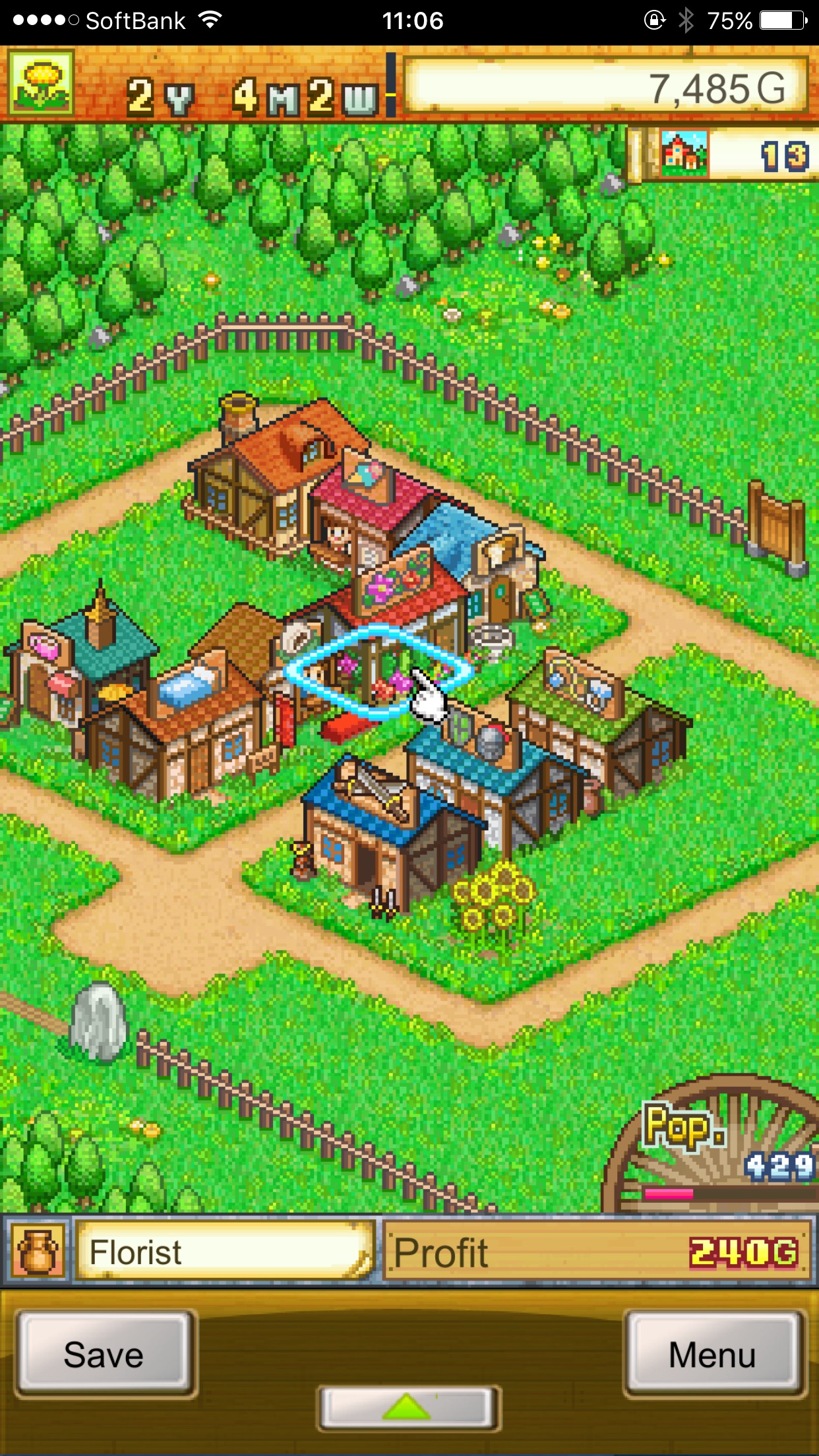 Kairosoft is a fairly well-known name in the mobile gaming scene, largely thanks to their breakout 2010 hit Game Dev Story ($4.99). They’re generally known for their variety of simulation games, covering just about any scenario you could imagine, plus a few you probably wouldn’t. In their quest to cover nearly any reasonably good idea, they’ve dabbled with RPG elements on at least a few occasions. Never was that more apparent than with Dungeon Village ($5.99), a 2012 release that puts you in charge of building an RPG town. While you’re never directly in control of the adventurers that pass through or reside in the town, you are responsible for a lot of their parameters and gear choices. Those adventurers will level up as they battle enemies outside of the town, and there are quests to complete and bosses to defeat. While it’s definitely primarily a simulation game, there are enough RPG mechanics involved that I think it falls under the umbrella of our little venture here.
Kairosoft is a fairly well-known name in the mobile gaming scene, largely thanks to their breakout 2010 hit Game Dev Story ($4.99). They’re generally known for their variety of simulation games, covering just about any scenario you could imagine, plus a few you probably wouldn’t. In their quest to cover nearly any reasonably good idea, they’ve dabbled with RPG elements on at least a few occasions. Never was that more apparent than with Dungeon Village ($5.99), a 2012 release that puts you in charge of building an RPG town. While you’re never directly in control of the adventurers that pass through or reside in the town, you are responsible for a lot of their parameters and gear choices. Those adventurers will level up as they battle enemies outside of the town, and there are quests to complete and bosses to defeat. While it’s definitely primarily a simulation game, there are enough RPG mechanics involved that I think it falls under the umbrella of our little venture here.
Let’s talk a little about Kairosoft first, though. While most of the world learned of them in 2010 when they released Game Dev Story for smartphones worldwide, the company has actually been around since 1996. Kairosoft was founded in Shinjuku, Tokyo by Kazuyuki Usui, and started off as an independent Windows PC game developer with a mere nine members on staff. While the Windows game market has never been very big in Japan, what the independent scene lacks in raw numbers, it makes up for in enthusiasm. Interestingly, Kairosoft’s first game wasn’t terribly different in concept from its recent releases. Simply titled The Used Book Store, the game had you managing a second-hand book store. You can spot traces of what would become Kairosoft’s house style in the game, but it’s considerably more primitive than you might expect. Their next game was a sequel that introduced an isometric perspective, forming the basis that the company would build on for the next 20 years.
While Kairosoft was prolific enough in its first few years, it wasn’t until the company made the move to mobile that things really got going. That happened in 2001, when Kairosoft began releasing their games on Japanese feature phones. The mobile gaming market caught on more quickly in Japan than in other regions, so this was a good way for a smaller game developer to break into a larger market. While Kairosoft put out the occasional title that broke from their tradition, such as the basic card game Card Change, for the most part they stuck to the same sort of games they had always done. Game company simulators, manga studio simulators, and various store simulators helped build their brand among mobile gamers. Unfortunately, the nature of the market meant that brand was essentially isolated to their home country, but it was a good start.
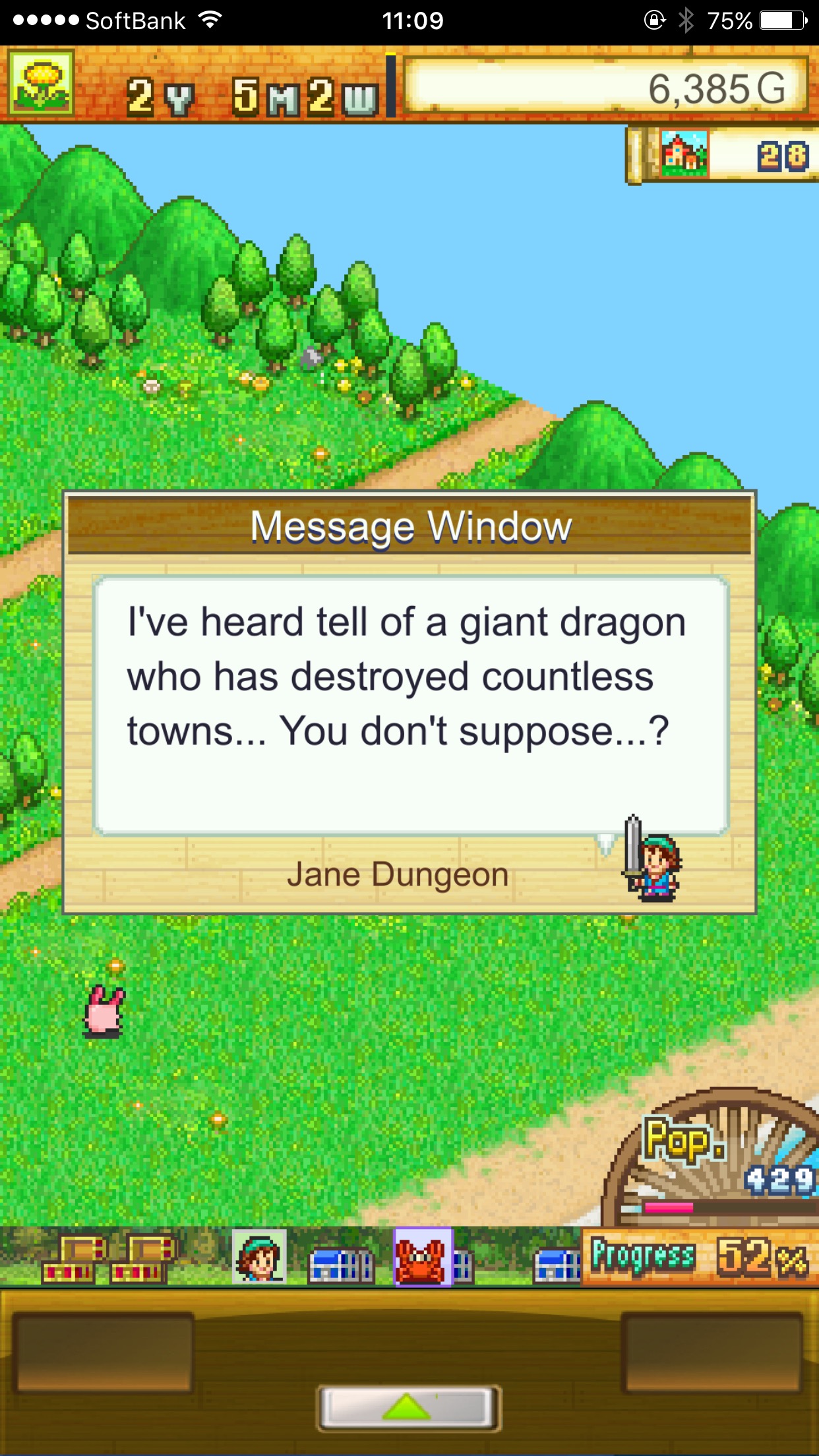 The company officially incorporated in 2007, though they maintained their relatively small size. The release and extreme success of smartphones that soon followed finally gave Kairosoft their window to the rest of the world. Their first smartphone game was a port of their popular game developer simulator, Game Dev Story, which had previously been released in Japan on Windows PCs and feature phones. This time, however, an English release came scant months after its summer 2010 debut in Japan, and it caught on in a big way. To this day, Game Dev Story remains the company’s most famous title, and its success likely buoyed the company for a long time after. You might think the developer would follow this up with a sequel, but Kairosoft’s never been all that great at doing what people might think. Instead of another game developer simulator, their next release was a hot springs simulator. To this day, they’ve yet to return to the game developer concept on mobile, though when asked about it, Kairosoft always insists a sequel will come.
The company officially incorporated in 2007, though they maintained their relatively small size. The release and extreme success of smartphones that soon followed finally gave Kairosoft their window to the rest of the world. Their first smartphone game was a port of their popular game developer simulator, Game Dev Story, which had previously been released in Japan on Windows PCs and feature phones. This time, however, an English release came scant months after its summer 2010 debut in Japan, and it caught on in a big way. To this day, Game Dev Story remains the company’s most famous title, and its success likely buoyed the company for a long time after. You might think the developer would follow this up with a sequel, but Kairosoft’s never been all that great at doing what people might think. Instead of another game developer simulator, their next release was a hot springs simulator. To this day, they’ve yet to return to the game developer concept on mobile, though when asked about it, Kairosoft always insists a sequel will come.
Still, the reputation gained from Game Dev Story was enough to put extra attention on their subsequent releases, no matter how niche the topic matter. With a relatively large back catalog of titles from previous platforms to draw from, Kairosoft was releasing new simulation games at a fairly rapid pace. Many of those games differed very little from one another beyond the subject matter, but at least for a while, no one really cared too much. By the time 2012 rolled around, however, exhaustion had started to set in for many fans. Players were getting tired of waiting for news on Game Dev Story‘s follow-up, and the continued application of one or two gameplay templates to an increasing number of games had many people begging for something different. Whether in response or simply by chance, Kairosoft released a pair of games around mid-2012 that, if nothing else, changed the routine a little bit. One of those was Epic Astro Story ($4.99), and the other was Dungeon Village.
Epic Astro Story probably has more meat on its bones, and if you’re a sci-fi fan, I’d highly recommend it. That said, as an RPG fan, Dungeon Village really scratched my ribs. I’ve always enjoyed games that let us see what it’s like to be someone other than the hero in an RPG world. I got my first taste of it in Dragon Quest 4 ($14.99), found it immensely fascinating in Ultima Online, and recently have enjoyed the idea in games like Recettear and Weapon Shop de Omasse. Dungeon Village pulls things out a little farther than those games. Rather than playing an individual, you’re running a whole town, and you actually have quite a bit of input into how the local adventurers are set up. First and foremost, you’re trying to run a successful town, so you need to be mindful of the budget and do things to cultivate your town’s popularity. But a big part of that is ensuring that the adventurers are strong and well-equipped enough to hunt for treasures and beat down the local monster mobs.
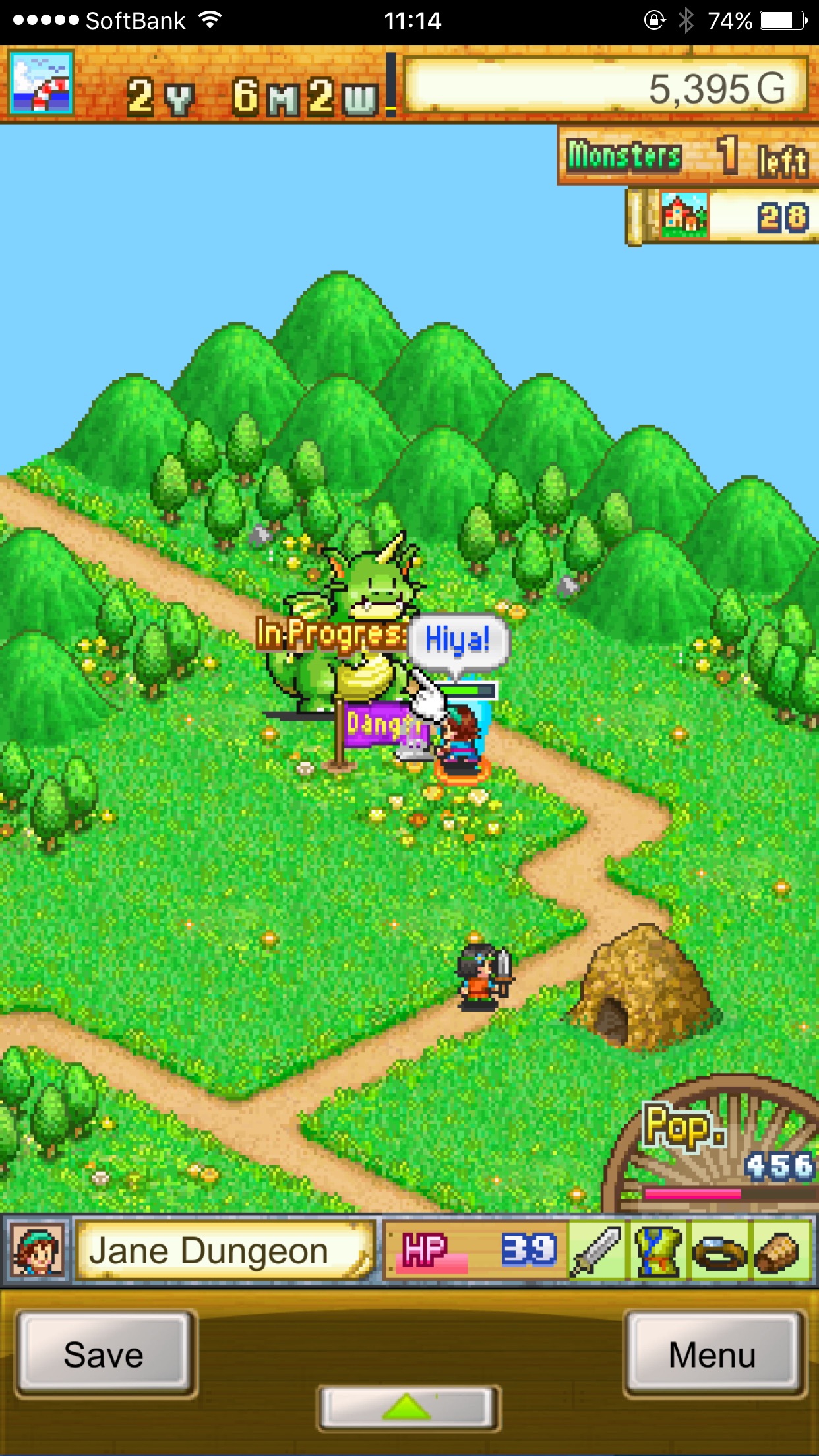 Your weapon, armor, and accessory shops start with very few items, but anytime an adventurer finds something new, it’s added to the stock permanently. That’s useful not only because it adds higher-value items for adventurers to buy from you, but also because you can then gift those items to adventurers whenever you have enough money. Adventurers will equip items you gift them, so a big part of making sure the local monster mobs can be handled is in keeping the local adventurers’ equipment up to date. That all costs money, of course, so it’s important to balance how many presents you’re giving with how much cash everything is bringing in. Sending adventurers on a quest will certainly uncover more items for you and increase the town’s popularity, but questing adventurers usually aren’t generating any revenue.
Your weapon, armor, and accessory shops start with very few items, but anytime an adventurer finds something new, it’s added to the stock permanently. That’s useful not only because it adds higher-value items for adventurers to buy from you, but also because you can then gift those items to adventurers whenever you have enough money. Adventurers will equip items you gift them, so a big part of making sure the local monster mobs can be handled is in keeping the local adventurers’ equipment up to date. That all costs money, of course, so it’s important to balance how many presents you’re giving with how much cash everything is bringing in. Sending adventurers on a quest will certainly uncover more items for you and increase the town’s popularity, but questing adventurers usually aren’t generating any revenue.
As your town grows, you’ll attract more and more adventurers, bringing new job types and new abilities. They’ll gain experience from fighting battles and level up, gaining stat increases and becoming more powerful. Before long, you’ll be able to change the job classes of each of your permanent resident adventurers, allowing them to build up a variety of skills. You’ll also eventually open up a feature where you can combine items into new ones. So while you might not have direct control over battles and the simulation elements certainly rule, there’s an awful lot of RPG goodness to be found in the mechanics of Dungeon Village. While I suppose all of this investment into the adventurers isn’t so different from raising staff members in other Kairosoft games, I tend to feel more attached to my characters in this game. Seeing them wield the new weapon I gave them as they tackle the latest mega-boss that’s stomping around outside the gates is pretty satisfying.
Dungeon Village celebrates RPGs in more ways than simple mechanics, however. A lot of the fun of Kairosoft’s games comes from their silly sense of humor and inside jokes, and this game is rich with them. Adventurer names include game-specific riffs like Clown Stripe and Fluffie Kiss along with broader joke names like Lance Alot and Donkey Hotty. Many of the specific job classes are obviously patterned after the iconic designs from Dragon Quest 3 ($9.99), and the monsters can be awfully familiar as well. The game feels like it was created and localized by genuine JRPG fans, and their passion shines through brightly. The usual Kairosoft icons also make their appearances, so don’t be surprised to see a luchador or clown show up in your town, either.
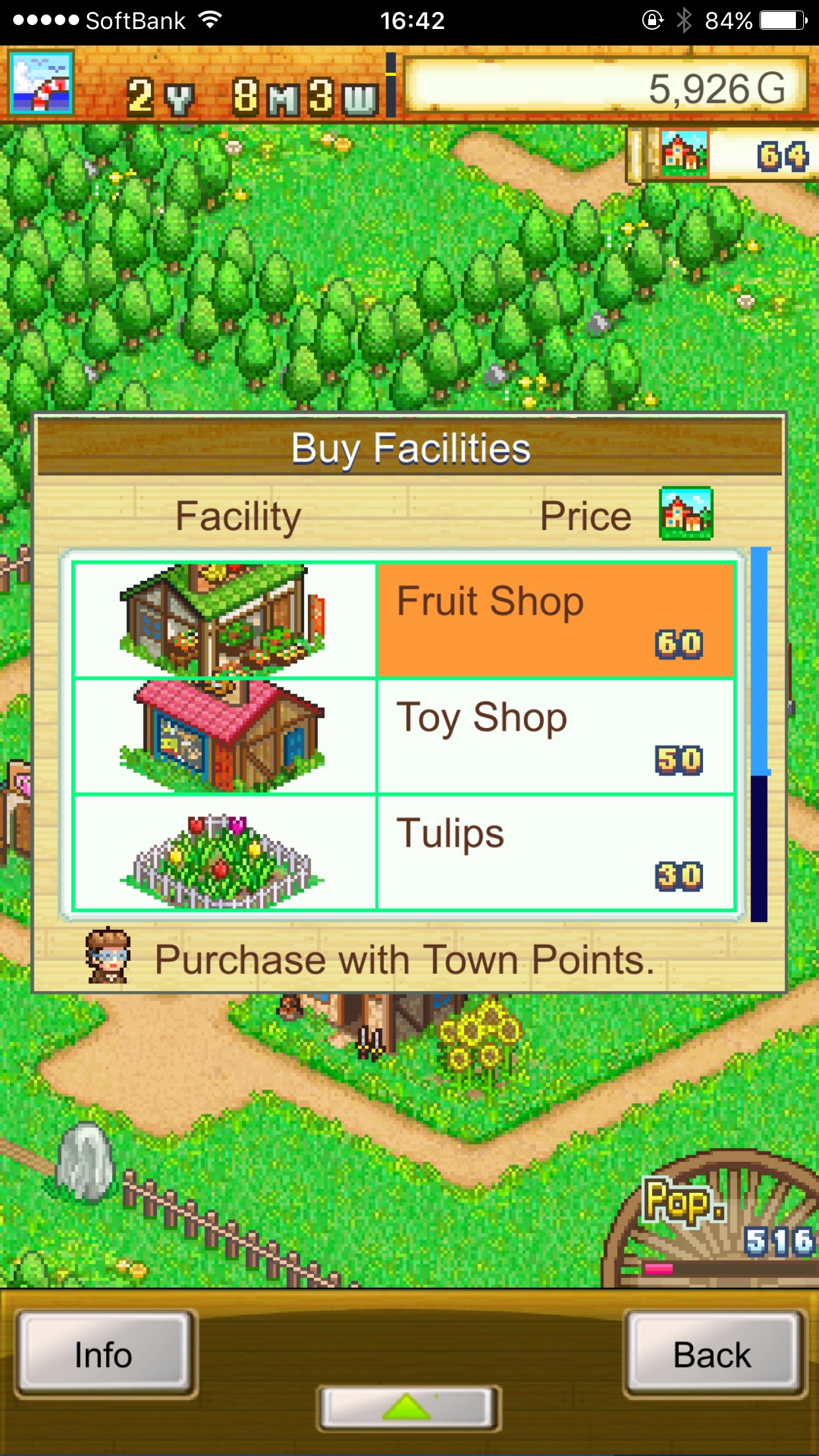 Ultimately, you’re trying to get your town a five-star ranking. It’s not a particularly difficult task, and like most Kairosoft games, you’d have to actively try to lose. Even then, the game will likely give you hand after hand to help you get back up. There’s a time limit where your score is officially tallied and added to the high score board, but nothing is stopping you from carrying on and completely finishing everything. To tell the truth, I usually check out of Kairosoft games not long after the score is added up, but in Dungeon Village, I always end up hanging around a lot longer. I can’t very well leave heroes at a low level, can I?
Ultimately, you’re trying to get your town a five-star ranking. It’s not a particularly difficult task, and like most Kairosoft games, you’d have to actively try to lose. Even then, the game will likely give you hand after hand to help you get back up. There’s a time limit where your score is officially tallied and added to the high score board, but nothing is stopping you from carrying on and completely finishing everything. To tell the truth, I usually check out of Kairosoft games not long after the score is added up, but in Dungeon Village, I always end up hanging around a lot longer. I can’t very well leave heroes at a low level, can I?
I think that’s why Dungeon Village works so well for me. I basically enjoy Kairosoft’s games to begin with, but throw in some RPG mechanics and fanservice and you’ll definitely have me on a hook. I don’t often replay Kairosoft’s games. There are far too many, and they’re far too similar to one another. My initial playthrough of Dungeon Village made me feel like it was less replayable than most of their games, because it was fairly simple to do just about everything in a single run, but to be honest, I’ve rather enjoy taking another run through the game for this article. I suppose four years is a substantial gap, but it was enough to make Dungeon Village feel relatively fresh again. It helps that Kairosoft hasn’t used this template nearly as often as some of their others. We’re lucky to see one game a year from them that uses similar RPG elements, and true to company form, they’ve never returned to the theme itself.
As with many of Kairosoft’s games, Dungeon Village has received several updates since release to make sure it continues to work well on new hardware and iOS versions. The most recent set of updates has moved the game from its original engine to Unity, which should help maintain compatibility for the future. The game still plays like it was ported from a keyboard-and-mouse interface, but the text is clean and the graphics fill up bigger screens nicely. The relative similarity of Kairosoft’s games to one another along with their simplicity likely means these games will be safe for as long as the company is around. I don’t think any of their games have ever broken for very long, and they’ve never pulled any games to the best of my knowledge.
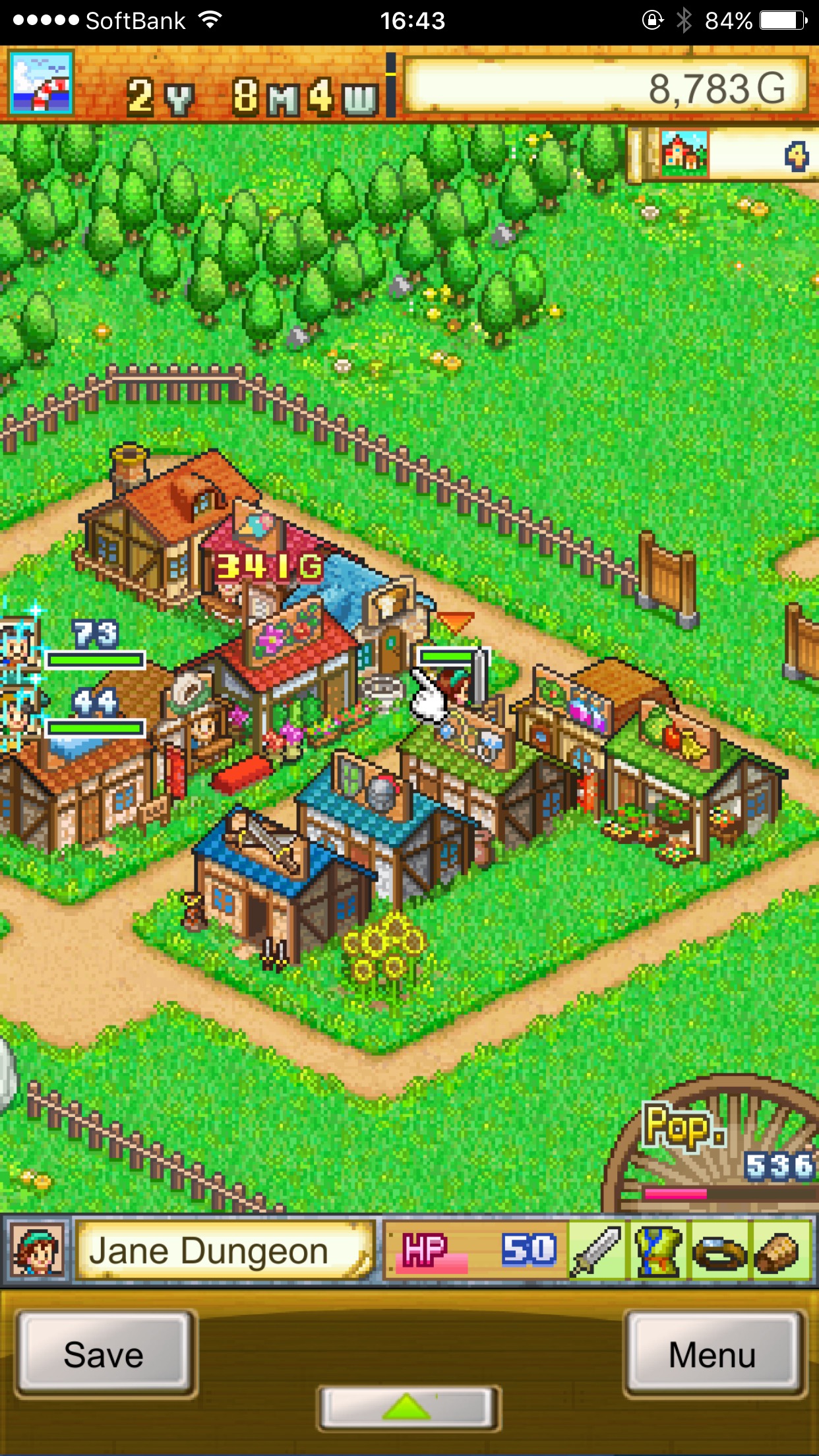
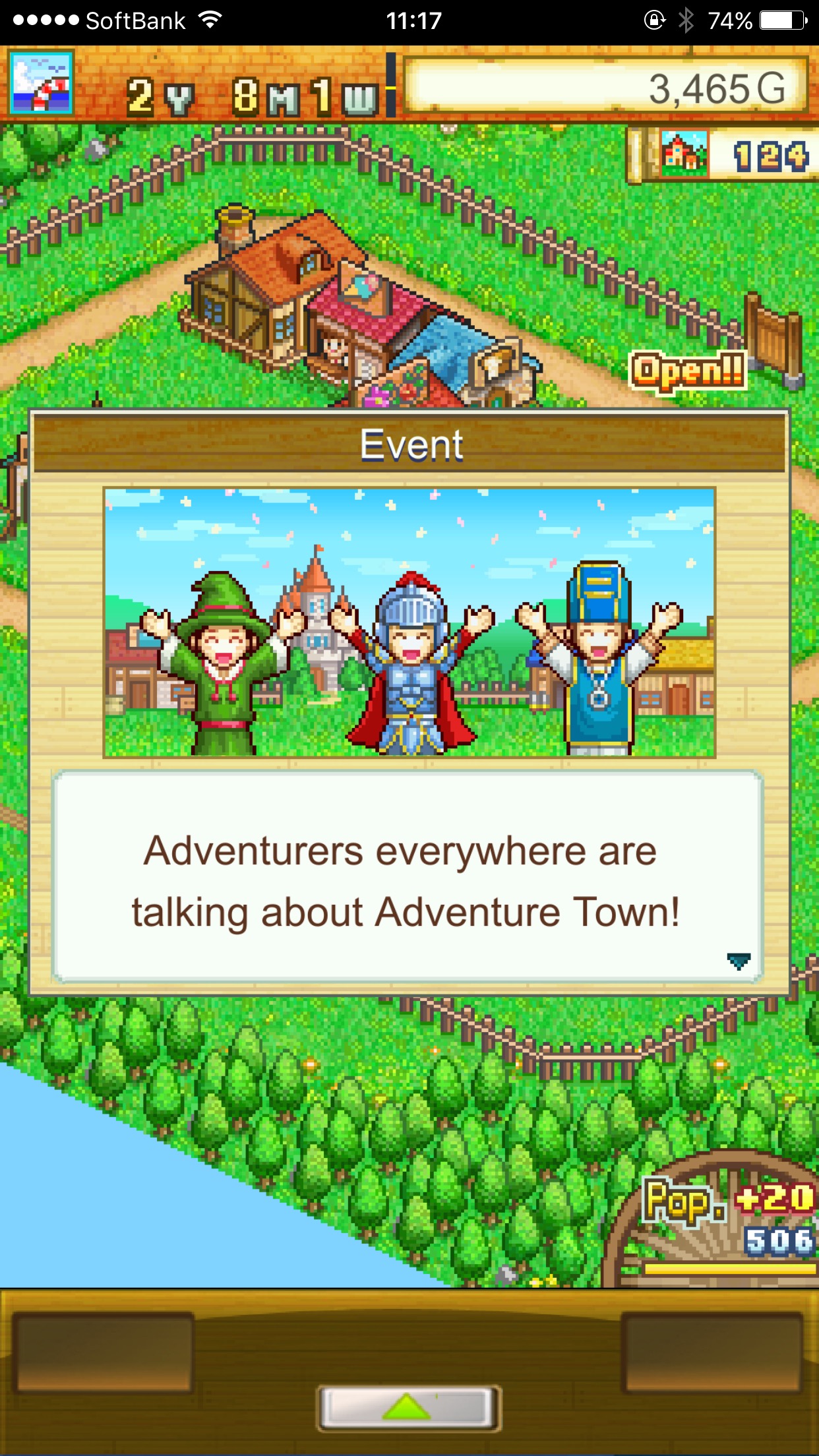
Sure, it’s a lighter experience than many of the games we typically cover here, and it’s more of a cousin to RPGs than an RPG itself, but Dungeon Village has plenty of appeal to RPG fans looking for something a little low-key between bigger adventures. I can’t imagine replaying it too often, but I could see myself starting the whole thing from scratch again in a couple of years. Who knows, maybe we’ll even have the elusive Game Dev Story 2 by then? Probably not.
That’s my take on Dungeon Village. What do you all think? You can let me know by leaving a comment below, posting in the Official RPG Reload Club thread in the forums, or by tweeting me at @RPGReload. As for me, I’ll be back next week with a more conventional RPG, albeit one with a sadder tale to tell in more ways than one. Thanks for reading!
Next Week’s Reload: Chaos Rings 2